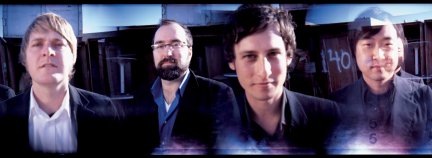
I’ve been following the Court & Spark since I heard an interview segment on NPR back in 2001 around the time of their Bless You release. What I heard at the time was a logical progression from some of the other artists I had been listening to at the time. I was a big Neil Young fan, I liked Son Volt, the Jayhawks, Joe Henry, Jack Logan, and other artists who would unfortunately get lumped into the category of alt.country, or Americana. People love convenient labels, I guess.
Admittedly, the earler records from The Court & Spark (Ventura Whites, and to an extent Bless You) have many influences from the same place as other artists that share that category. Just take a look at the Byrds– were they country, or were they rock? Take a look at Neil Young– is he country, or is he rock, or folk for that matter? Is Tom Petty rock? He certainly can pull in some twang when desired. What about the Eagles? Even Fleetwood Mac with Lindsey Buckingham at the helm recorded a couple of songs that could be called country– check out “That’s Alright” from Mirage. A lot of Clapton’s output in the Seventies sure sounds like country (“Lay Down Sally,” “Promises”). The point here being that good bands and artists get great by stretching their boundaries. The more influences that an artist can draw from, the richer the work.
And, so it is with the Court & Spark’s new album Hearts (released May 2nd). Hearts is the sound of a band that is stretching its boundaries by diving a little more away from their rootsy or folksy sound and more towards a rock sound. In fact, in an interview with The San Francisco Chronicle, singer, lyricist and guitarist M.C. Taylor said that they were “being painted into a corner” and that Hearts is a reaction to that.
Hearts is an album that is unique and familiar both at the same time. It has the typical laid-back, mid-tempo feel that all of the Court & Spark records have. There is this underlying darkness that beckons, too. This is the first full-length album recorded by the band at their recording studio The Alabama Street Station. As is typical with bands who finally get their own space– they can spend time on the record without fear of racking up expensive studio time. This extra effort shows in the sometimes subtle, and sometimes not-so subtle sound textures used in the album. The band employs everything from toy pianos on the stomping “Your Mother Was the Lightning” to dulcimers and typewriters. Even with the sound effects on the tracks the album still has a consistent feel. The production values and layers of sound effects are not blips and bloops of electronica, but more classic studio type effects that you’d hear from Smile-period Beach Boys or the Beatles. The whole album sounds like it could have been recorded in 1971– that precarious hangover time after the end of the Summer of Love and the beginning of the next party that would be disco.
The record starts off with “Let’s Get High,” which does a great job of setting the tone for the rest of the record. A mellow, sexy affair with M.C. singing an invitation to “swim down, you’ve got beautiful fins.” This song reminds me of the best work of The The (what the hell happened to Matt Johnson anyway?). Lot’s of layered guitars and horns slathered over a sparce beat that firmly puts M.C.’s voice front and center. Most of this song sounds like it was processed through the spinning speaker of a Leslie. In fact, that effect is used all over the record.
The album transitions to the breezy “We Were All Uptown Rulers” which is included for your listening pleasure thanks to the permission of the band’s management. In typical fashion, it is nearly impossible to tell what this song is about. The only reference to “Uptown Rulers” I could find was a Meters album. The song seems sad and defeatist. Whomever this song is about, his other Uptown Ruler compatriots have been killed off, and he’s the last one. But, he’s standing his ground.
The accordion or melodeon along with the strings and whistling makes “Birmingham to Blackhorse Road We Wandered” sound distinctly Scottish folk. I have to say that M.C.’s lyrics, while obscure, do paint a picture. When he sings “Lay your diamond hand on me, lay your hands on me” I wonder if that means that the narrator’s love interest he “met at the change of the century” is married?
Hearts has four instrumental interludes spread throughout the album. They make for nice spacing between the tracks. The first one following “Birmingham” is “The Oyster Is A Wealthy Beast” takes advantage of bouncing strings under a solo lone violin. In the last 45 seconds it breaks down to the sounds of water lapping on the shore.
Clocking in at six minutes, the following track is the monumental centerpiece to the album, “Capaldi.” I can only assume that this is a tribute to the late Traffic member Jim Capaldi. It certainly sounds like a send-up of a Traffic song with its analog synth and arpeggiated guitar and bass guitar hook coated in fuzzy distortion.
“Capaldi” is followed by “A Milk White Flag”– the second of the four interludes. I notice that these tracks seem to fit together. They have a “music from another room” feel to them. Nice use of reverb. This is followed by “Berliners” which is a slow strumming ballad about what seems like a voyeuristic ghost pining for love of a living girl. Wandering tape noises under the guitars drive home the feeling of loss. We are greeted again by an instrumental called “Smoke Snigals” [s.i.c]. I guess appropriately titled considering the previous track begged for someone to “talk to me!”
When you listen to this with headphones you get to hear M.C. take a breath before starting the next track, “Mother Was the Lightning.” A slapping 2-step beat and tick-tock guitar propels this head-bobber. This song seems to be about a family doomed for disaster sung from the vantage point of a boyfriend. A universal theme, I think. The song winds out with toy piano and claps and Leslie tinged vocals.
“The High Life” starts out as slow waltz of a song that reminds me a bit of the classic “The Night Life.” Around 2:50 the song switches gears to a driving four-on-the-floor with layers of soaring guitars and keyboards that seems more like an early-Seventies progressive track by Yes. This is followed by the last of the instrumentals called “Gatesnakes.” This track is more of an exercise in layering sounds effects over a lone piano track reminding me a bit of Game Theory’s experimentation on Lolita Nation. After two minutes of that we move to the album closer called “The Ballad of Horselover Fat.” This is a spare vocals plus acoustic guitar that layers in other instruments as the song progresses to its chorus of “As a man I fade away.” Horselover Fat is the alter-ego of Sci-Fi writer Philip K. Dick that he used in one of his last novels VALIS, in 1981. I haven’t read this one, but I guess that it deals mostly with Dick’s search to understand God. A nice way to end this album, I feel.
In attempting to break the perception that they were a “country” act, the Court & Spark have recorded their most interesting and complete work to date. It’s time to catch the Spark of these high-heeled boys.
Download “We Were All Uptown Rulers”
Download a Live Version of “Capaldi”
Download a Live Version of “Your Mother was the Lightning”
Band photo by Peter Ellenby

